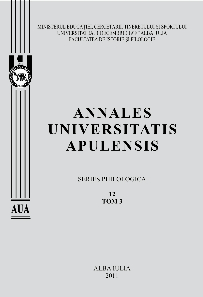Hélène Grimaud et l’interdisciplinarité : la musique, la littérature, l’éthologie
Hélène Grimaud and Interdisciplinarity: music, literature and ethnology
Author(s): Olga GanceviciSubject(s): Literary Texts
Published by: Universitatea »1 Decembrie 1918« Alba Iulia
Keywords: Fiction; Autobiography; Ethology; Wolf; Classical Music; Pianist; Interdisciplinary.
Summary/Abstract: In 2003, Hélène Grimaud, a French pianist of international repute, breaks the harmony engendered by her hands. Her approach is not at all destructive, for it will give rise to a different type of harmony this time, the one pertaining to the Word. The stories of the artist’s adolescence and of her first concertistic successes, are interwoven with a different passion, a rather exotic one – to avoid calling it eerie – which the young virtuoso discovers next to the wolves that will offer her the opportunity of a new kind of artistic relaunch: Variations sauvages (Paris, Robert Laffont, 2003). We are in the presence of an autobiographical book in diptych, which outlines the profile of a pianist, of a humanitarian, but also of an accomplished writer: between music and wolves, the literary discourse fulfils the necessary conditions to be worthy of the exegesis’ focusing on it. Being, in the first place, the result of our reading, the analysis proposed by us does not clarify the musical background, including names such as Bach, Brahms, Schumann, Liszt, Beethoven, Chopin and others, inseparable from Hélène Grimaud’ entity. Leçons particulières (Paris, Ed. Robert Laffont, 2005) represents the second book, a piece of (auto)fiction following closely the steps taken by the pianist. The publishing of the first book was highly successful. In parallel, within several months (namely, since the end of 2004 and along the former half of 2005), Hélène Grimaud ranked first in the classical music charts with her latest recording. It is a selection from Chopin (who happens to be her favourite composer, as confessed by herself) and from Rachmaninov. We cannot state that it is the success of the published book which led to the pianist’s concertistic success. One form of success does not exclude another. Both domains, the literary and the musical one, show the span of Hélène Grimaud’s personality. Other recordings, before the mentioned CD, with performances from Gershwin or Bartok, interviews given by the artist to several musical journals, as well as TV interviews, can constitute as many reference points in the studying of the two published novels. At its origin, our paper was particularly provoked by certain critics who saw in Hélène Grimaud’s editorial success the mere consequence of her natural charm. Obviously, this definitely does not represent a valid a criterion to judge the literary work by, as we shall point out in our paper. It is an argument related rather to the tabloids’ practice and we shall not take it into account, although, in an atypical way for a classical artist, Hélène Grimaud has achieved the notoriety of a pop star or a rock one. Certain metaphors, a quite solemn style, especially in her second novel, Leçons particulières, raise the problem of artificiality, of an unnatural language but this intentionally constructed style does not come in opposition with the writer’s purpose to share her fundamentally personal experience.
Journal: Annales Universitatis Apulensis. Series Philologica
- Issue Year: 12/2011
- Issue No: 2
- Page Range: 153-168
- Page Count: 15
- Language: French

